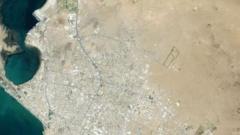Syria's interim government is enforcing a new dress code at public beaches, mandating women to wear burkinis or cover their bodies fully in a push for public decency and safety.
Syria Enforces Burkini Mandate for Women at Public Beaches

Syria Enforces Burkini Mandate for Women at Public Beaches
New regulations require burkinis or modest clothing for women at public swimming venues in Syria
In a bid to enhance public safety and uphold modesty, Syria's Islamist-led interim government has introduced a decree requiring women at public beaches and swimming pools to don burkinis—swimwear that covers all but the face, hands, and feet—or similar "decent" clothing. The tourism ministry's regulations aim to preserve societal norms as reported by the Syrian state news outlet Al-Ikhbariyah al-Suriyah.
These regulations, however, exempt private beaches, clubs, pools, and hotels rated above four stars. While many women in Syria traditionally opt for modest swimwear, there has been a growing inclination towards Western styles among others.
According to the directive, individuals visiting public beach areas and pools must don "more modest swimwear," specifically stating that the burkini or any swimming attire that covers more skin is preferred. Women are also instructed to wear a loose cover-up over their bathing suits when moving between swimming areas, and any travel in such attire outside designated beach premises without suitable cover is forbidden.
For men, shirts are mandated when not in swimming areas, prohibiting bare-chested appearances. The rules allow "normal Western swimwear" in exempt locations but still stress that participants should adhere to "public taste," discouraging transparent and tight clothing and encouraging the use of loose garments that cover knees and shoulders.
The directive does not detail potential penalties for non-compliance or enforcement measures and intertwines with other safety guidelines for pool and beach usage. The recent changes come on the heels of political shifts following the fall of Bashar al-Assad's regime last December by Islamist rebel forces led by Ahmed al-Sharaa, who has expressed intentions for an inclusive governance model focusing on women's education and rights.
In March, Sharaa signed a constitutional declaration indicating Islam's role in governance while simultaneously assuring guarantees for women's rights, freedom of expression, and media independence.
These regulations, however, exempt private beaches, clubs, pools, and hotels rated above four stars. While many women in Syria traditionally opt for modest swimwear, there has been a growing inclination towards Western styles among others.
According to the directive, individuals visiting public beach areas and pools must don "more modest swimwear," specifically stating that the burkini or any swimming attire that covers more skin is preferred. Women are also instructed to wear a loose cover-up over their bathing suits when moving between swimming areas, and any travel in such attire outside designated beach premises without suitable cover is forbidden.
For men, shirts are mandated when not in swimming areas, prohibiting bare-chested appearances. The rules allow "normal Western swimwear" in exempt locations but still stress that participants should adhere to "public taste," discouraging transparent and tight clothing and encouraging the use of loose garments that cover knees and shoulders.
The directive does not detail potential penalties for non-compliance or enforcement measures and intertwines with other safety guidelines for pool and beach usage. The recent changes come on the heels of political shifts following the fall of Bashar al-Assad's regime last December by Islamist rebel forces led by Ahmed al-Sharaa, who has expressed intentions for an inclusive governance model focusing on women's education and rights.
In March, Sharaa signed a constitutional declaration indicating Islam's role in governance while simultaneously assuring guarantees for women's rights, freedom of expression, and media independence.



















